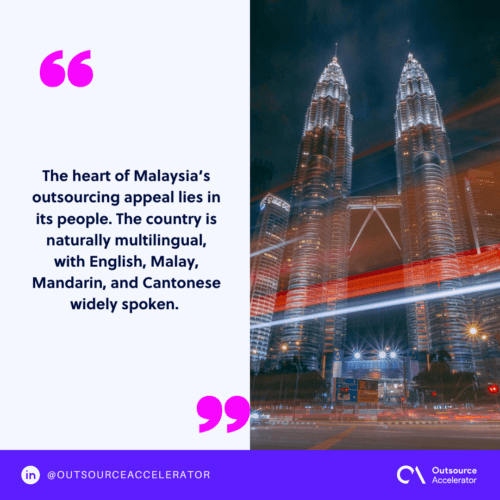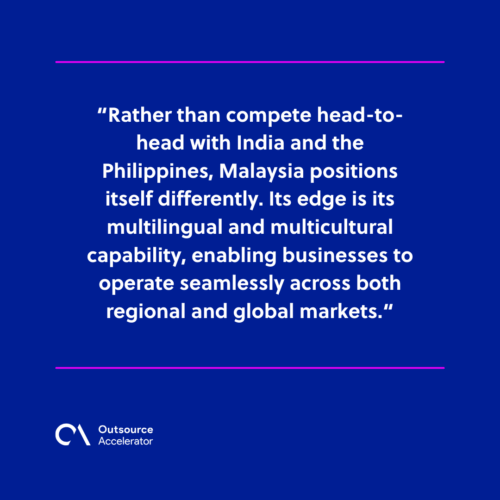Malaysia outsourcing: The country’s role as a multilingual outsourcing hub

For decades, India and the Philippines have been the dominant names in outsourcing. But the market is no longer defined by just two players. As global businesses seek efficiency, scalability, and cultural fluency, other Asian countries are stepping into the spotlight.
Malaysia outsourcing has emerged as one of the most exciting growth stories in this space.
With its mix of languages, strategic geography, and supportive government policies, Malaysia is positioning itself as a hub for multilingual and multicultural outsourcing services.
In the 554th episode of the Outsource Accelerator Podcast, Ajay Agarrwal, founder and CEO of SummitNext, offered a first-hand perspective on why Malaysia is attracting so much attention.
Malaysia’s unique multilingual advantage
The heart of Malaysia’s outsourcing appeal lies in its people. The country is naturally multilingual, with English, Malay, Mandarin, and Cantonese widely spoken.

Ajay explained: “We do provide a number of languages—obviously English, Malay, Mandarin, and Cantonese is our bread and butter. Those languages are available locally.”
This means Malaysia outsourcing providers can support multiple Asian markets straight out of the gate. Businesses don’t need to juggle multiple vendors just to cover their regional language needs.
The government has also stepped in to expand this advantage. Through MDEC (Malaysia Digital Economy Corporation), approved outsourcing firms can bring in foreign professionals when additional language support is required.
As Ajay noted: “We are able to bring in other nationalities… pretty much all the Asian nationalities.”
By blending local linguistic strength with international talent relocation, Malaysia offers something few competitors can match: a flexible, multilingual workforce that spans Asia and beyond.
Drivers of demand for Malaysia outsourcing
Malaysia’s strengths are clear, but what’s fueling the rising demand? Three key drivers stand out.
1. China’s market shifts
China’s economy remains massive, but uncertainty has led multinational companies to look elsewhere.
Ajay observed: “Chinese companies have shown a lot of interest for Malaysia over the last one, one and a half years. Multinational companies that were running businesses in China—there is this element of uncertainty, and they want to move out of China to a safer location.”
At the same time, Chinese firms eager to expand into Western markets need bilingual talent.
“They’re looking for people that can speak their language and can also speak English, which is a bit difficult for them to find within China and pretty much standard to find in Malaysia,” Ajay explained.
2. Regional neighbors
Companies in Singapore, Hong Kong, and Taiwan are also fueling demand for Malaysia outsourcing. These are highly international markets that require customer support and technical assistance across multiple languages.
Malaysia, with its proximity and talent pool, is perfectly placed to serve them.
3. Western expansion into Asia
For companies from the US and Europe entering Asia, Malaysia serves as a gateway. It offers cultural familiarity with the West and linguistic connectivity with the East, making it a natural bridge for global business.
Malaysia’s comparison with other outsourcing destinations
To understand Malaysia’s position, it helps to compare it with Asia’s outsourcing giants.
Philippines
Best known for its dominance in voice-based services, especially for US clients, the Philippines continues to lead in English-speaking call centers.
Ajay highlighted: “For our Philippines operations, it is primarily voice-based work that we are doing. And that’s how broadly the industry is going, especially for the outsourcing that happens out of the US.”
India
India’s scale and talent pool are unmatched, but its focus has shifted.
Ajay reflected: “Outsourcing is still big business in India, but it has changed drastically over the last 10 to 15 years from being a voice-only outsourcing destination to more backend outsourcing. Even the interest we are seeing from some of our clients is completely non-voice.”
Today, India dominates backend services, IT, analytics, and knowledge process outsourcing. Astute Analytica reported that IT services held a 23.46% market share of India’s BPO market.
Rather than compete head-to-head, Malaysia positions itself differently. Its edge is its multilingual and multicultural capability, enabling businesses to operate seamlessly across both regional and global markets.

In short:
- Philippines = Voice outsourcing powerhouse
- India = Backend/KPO specialist
- Malaysia = Multilingual, multicultural bridge
Malaysia outsourcing: Challenges and opportunities
Of course, no outsourcing destination is without its hurdles. Malaysia faces two main challenges:
- Relocation complexities: Bringing in expats can be slow and costly. Ajay admitted: “It’s a difficult process. It’s an expensive process to bring people into Malaysia.”
- Cost considerations: Malaysia outsourcing is often more expensive than India or the Philippines. For businesses focused solely on cost-cutting, this can be a barrier.
But these challenges also highlight Malaysia’s unique opportunities:
- Demand for multilingual support continues to rise across Asia and beyond.
- Malaysia is well-positioned for AI-driven outsourcing, particularly in data collection and annotation for language models. Ajay shared: “A recent project we delivered was where two people are supposed to talk in two different languages… even if there’s a mixture of words, the AI model is still able to figure it out.”
- Companies seeking quality and adaptability over cost alone see Malaysia as a strategic investment.
Malaysia as Asia’s future in multilingual outsourcing
Malaysia outsourcing isn’t trying to be the cheapest or the biggest. Instead, it is carving out a role as the most adaptable multilingual hub in Asia.
Here’s why:
- It has natural strengths in English, Malay, Mandarin, and Cantonese.
- It can import talent from across Asia and Europe to expand its linguistic portfolio.
- Its strategic geography makes it a cultural and commercial bridge between East and West.
As Ajay summed it up, “Those languages are our bread and butter.” For businesses seeking a multilingual outsourcing partner that can deliver flexibility, quality, and reach, Malaysia is emerging as the go-to destination.







 Independent
Independent




